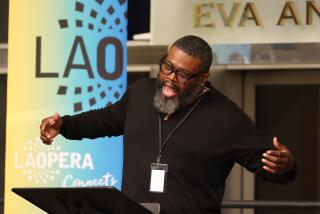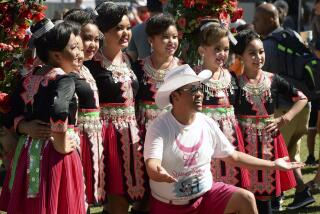A Cultural Icon Embraces a New Role in Post-Revolution China
SHANGHAI â Tong Xiangling was window-shopping here when a government car pulled up and he was hauled to an audition that would change his life.
Two songs later, Mao Tse-tungâs wife, Jiang Qing, personally cast him as the Peopleâs Liberation Army officer and bandit impersonator in the revolutionary opera âTaking Tiger Mountain by Strategy.â
His suave character played like a Communist James Bond, and the role catapulted Tong to superstardom during the 1966-76 Cultural Revolution. Almost everyone in China knew the lyrics to Tongâs arias of class struggle. His dashing square face and green army uniform became trademarks for eight yangbanxi, or model operas--one of the few forms of public entertainment permitted at the time.
More than 30 years later, the onetime cultural icon is making a living selling noodles in a small restaurant here. The changing political landscape long ago made the old hero obsolete, though his music is still popular and his name remains synonymous with the golden age of revolutionary opera.
In the beginning, Tong couldnât handle being seen waiting tables and washing dishes. At work he wore a surgical mask, large square glasses and a chefâs hat.
These days, however, the 66-year-old is doing his best to make peace with the role of revolutionary hero Yang Zirong. Instead of hiding his past, he is capitalizing on it. He renamed the shop after himself, hung pictures from his glory days and wrote a memoir to reflect on a career that was long out of his control.
But mostly, he is reinventing himself for the sake of his two sons, who inherited nothing but their fatherâs good looks and bad luck.
âI often tell them they wouldnât have ended up this way if they were not my sons,â said Tong, now a balding grandfather who fidgets like a child, in contrast to the charismatic hero who once held the nation spellbound.
Now the sons work at Tong Xiangling Noodle Shop, giving customers the illusion that there are three Yang Zirongs at work there. But the only backdrop for the sons is white plastic tablecloths and cheap fluorescent lights.
Ironically, Tong named his sons Yuming and Shengtian: âready to singâ and âconquer the sky.â Neither name correctly forecast their fortunes. Bad timing doomed the boys from continuing the opera greatness established by their parents, uncle and two aunts.
By the time Yuming was of school age, his father had been accused of not denouncing the boyâs aunt, a celebrated traditional opera star hated by Maoâs wife. Tong family members were labeled lackeys of old theater because they were trained during the pre-Communist days under old Peking opera masters.
But while his relatives were banished to reeducation camps, Tong was told to continue performing the role he helped create, as a means to atone for his sins. Few people outside the theater knew that after Tong took off his makeup as the Communist hero, he had to go home and write endless confessions--just like the prisoners he grilled on stage.
âWhen I was a kid, I saw Red Guards beat my aunt until she was unconscious,â said Yuming, 46, who wears spiky hair and straps a hunting knife to his belt. âI also saw them flush her head in the toilet so they could keep on beating her. I refused to learn opera because I didnât want to end up like her.â
But even as a child he couldnât escape guilt by association. A gang of Red Guards chased him and broke his leg. When the leg did not heal properly, a doctor had to break the bone anew and reset it, without anesthesia, according to his mother, Zhang Nanyun.
At 14, Yumingâs parents enlisted him in the army, where they thought that he would be safer. He was supposed to stay in the propaganda brigade, but he was transferred to the Special Forces unit in the remote Inner Mongolia.
Six years later, he returned to Shanghai and found work at a welding factory. A few years ago it went bankrupt.
Around the same time, his younger brother also became unemployed. But Shengtian, now 36, had always been crazy about the opera. Twice his parents tried to enroll him in professional opera school when he was younger, and twice he was rejected. His family background was not considered âredâ enough.
Even after the Cultural Revolution, he had no chance. His father was seen as Jiangâs ârunning dog,â though Maoâs widow--a master-mind of the radical extremism of the 1960s and â70s who later committed suicide in jail--had been just as ruthless to the Tong family.
As a consolation prize, the child who was supposed to conquer the sky went to work as an elevator operator. He practiced singing on his own and tagged along with his father on some gigs, stepping in for actors who fell ill. Even though audiences raved about his performance, officials would not permit him to study the craft professionally.
The father blamed himself.
âEvery day I stared at two unemployed sons, but I had no power to help them,â he said. âThese days all the jobs require professional degrees. They have nothing.â
Then six years ago, the sons came up with the idea of a restaurant. Tong decided to retire so he could help.
Business has been lousy. The location is terrible, and they have no money to move or renovate. But the men make do with emotional rewards. Tong recalls three customers--the oldest in his 90s, the youngest in his 70s--who traveled three hours from a distant suburb to see if Yang Zirong is really back in town, serving noodles.
âThey stared at me from the outside for a long time,â Tong said. âThen they held my hand and said, âWe really miss you.â â
A few years ago, a storm blew off the shop roof. Customers ran out in the rain to help nail it back. âAfterward, all they thought about was how I was doing, if I needed some water. I said to myself, I am nothing without the support of my audience.â
âHe was my first hero; I will never forget him,â said Hu Yuedong, 37, a customer who eats at the shop three times a week. âI used to dress up like him and pretend to be him.â
Huâs girlfriend, Cheng Yali, is nine years younger. She doesnât know who Tong is and doesnât care. Hu says thatâs not unusual.
âThereâs a huge generation gap between those born in the 1960s and â70s,â Hu said. âAll those born before 1968 should know who Tong is. He was our generationâs Sylvester Stallone and Arnold Schwarzenegger.â
Some old fans, however, worry about letting nostalgia slip into hero-worship.
âThe model operas are the products of extreme leftist politics,â said Chai Junwei, 38, who grew up adoring the shows but now runs a Web site for traditional opera buffs. âThe reason they are still popular is because they existed at the expense of all other artistic expression. How could you be proud of that?â
But Tong canât break his love-hate relationship with the past. Not that he cares to defend the Cultural Revolution, but he has yet to see how the commercial revolution sweeping China today is any better to the arts.
âPeople say eight great pieces in 10 years is not enough,â Tong said. âHow many years has it been since the Cultural Revolution ended? And how many shows have they produced since then that are worth remembering? But the model operas, 30 years later, people still sing them and love them. That makes it all worthwhile.â
More to Read
Sign up for Essential California
The most important California stories and recommendations in your inbox every morning.
You may occasionally receive promotional content from the Los Angeles Times.










